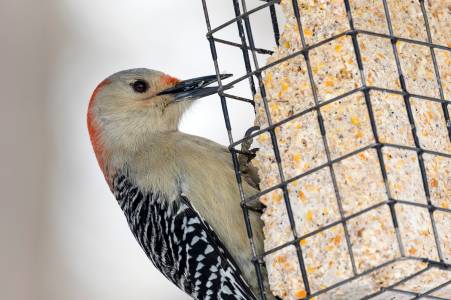Connect with a verified veterinarian in minutes. Licensed vets are available 24/7 to answer your questions. No need to worry about your furry family member.
Do you use bird suet to feed the wild birds in the backyard? If so, you’re not alone! Using bird suet is very common, especially in the winter months. Because suet is so common, this means dogs may also gain access to suet. But what happens if a dog eats bird suet?
Has your dog eaten bird suet? Are you worried the bird suet will make your dog sick? If so, then you’ve come to the right place. We understand it can be scary when your dog eats something like this.
We’ve put together information about bird suet and whether it can make a dog sick. Let’s get started!
What is Bird Suet?
Suet is a hard fat that is found around the kidneys and loins in mutton and beef. Suet is attractive to many birds, especially in the winter months when they need more energy to stay warm.
The suet used for birds is first melted, and the impurities are then removed. This process removes the impurities from the fat and helps it last longer. However, suet may also be made from a substitute mixed with other ingredients, including corn, peanuts, and more.
While suet can be safe and healthy for birds, what happens if a dog eats suet? Can bird suet make a dog sick?
Bird Suet & Dogs
Unfortunately, bird suet can make dogs very sick. The problem is that suet is fat and if dogs eat too much fat, they can develop a painful condition called pancreatitis.
Pancreatitis is a painful and often dangerous condition where the pancreas becomes inflamed. This condition can affect a dog of any age, breed, or sex. In addition, this condition can be acute or chronic. The condition can also be mild or severe.

Review symptoms, medications & behavior to keep your pets healthy with a Vet Online in just minutes.
Ask a Vet Live NowSymptoms of Pancreatitis in Dogs
You may notice these symptoms if your dog eats bird suet:
- Nausea
- Vomiting
- Fever
- Lethargy
- Abdominal pain
- Diarrhea
- Decreased appetite
- Severe depression
If you notice any of these symptoms in your dog, call the vet right away. This may be an emergency.
At the vet’s, they will run some lab work to check your dog’s underlying organ function and enzymes called Amylase and Lipase that can be elevated with pancreatitis. They may also do further blood tests that test specifically for pancreatitis. It may also be necessary to perform an ultrasound to see if the pancreas is inflamed.
The key to a dog’s survival is getting him treatment as soon as possible. If left untreated, pancreatitis can cause death. So, be sure to get your canine companion to the vet ASAP!
Connect with a verified veterinarian in minutes. Licensed vets are available 24/7 to answer your questions. No need to worry about your furry family member.

Aisling O'Keeffe, MVB CertSAM ISFMCertAdvFB
This article has been reviewed and approved by an independent Veterinarian: Aisling qualified as a vet 7 years ago from University College Dublin. She has worked in a mixture of UK small animal hospitals along with Irish practices. She worked for 3 years in a feline-only hospital where she further developed her feline medicine and surgery skills. She currently lives and works in a small animal hospital in Cork, Ireland.
Review symptoms, medications & behavior to keep your pets healthy with a Vet Online in just minutes.
Ask a Vet Live Now






